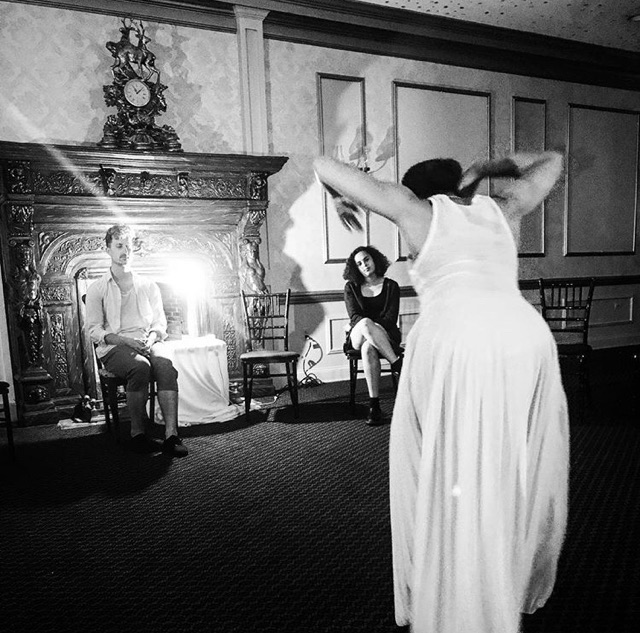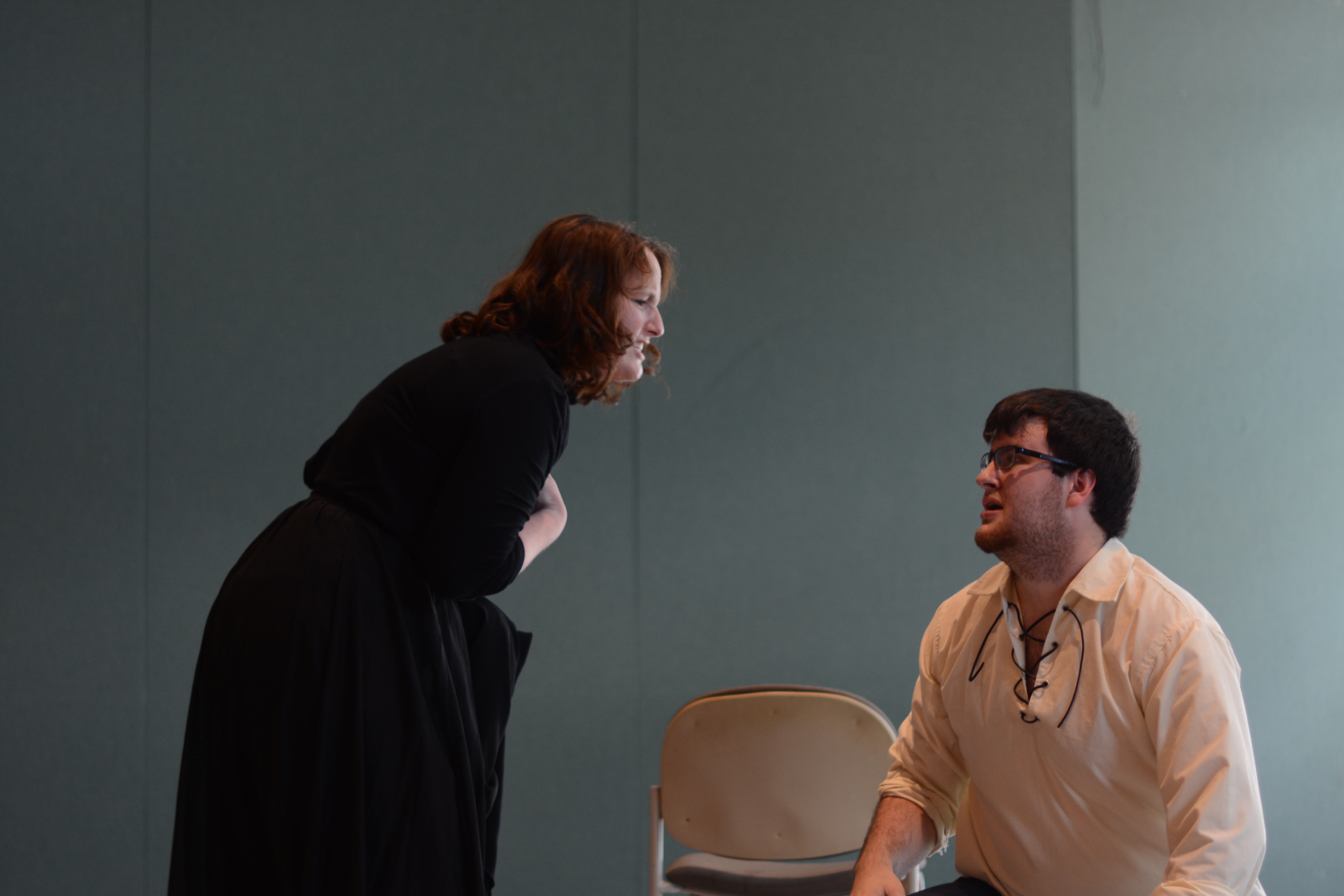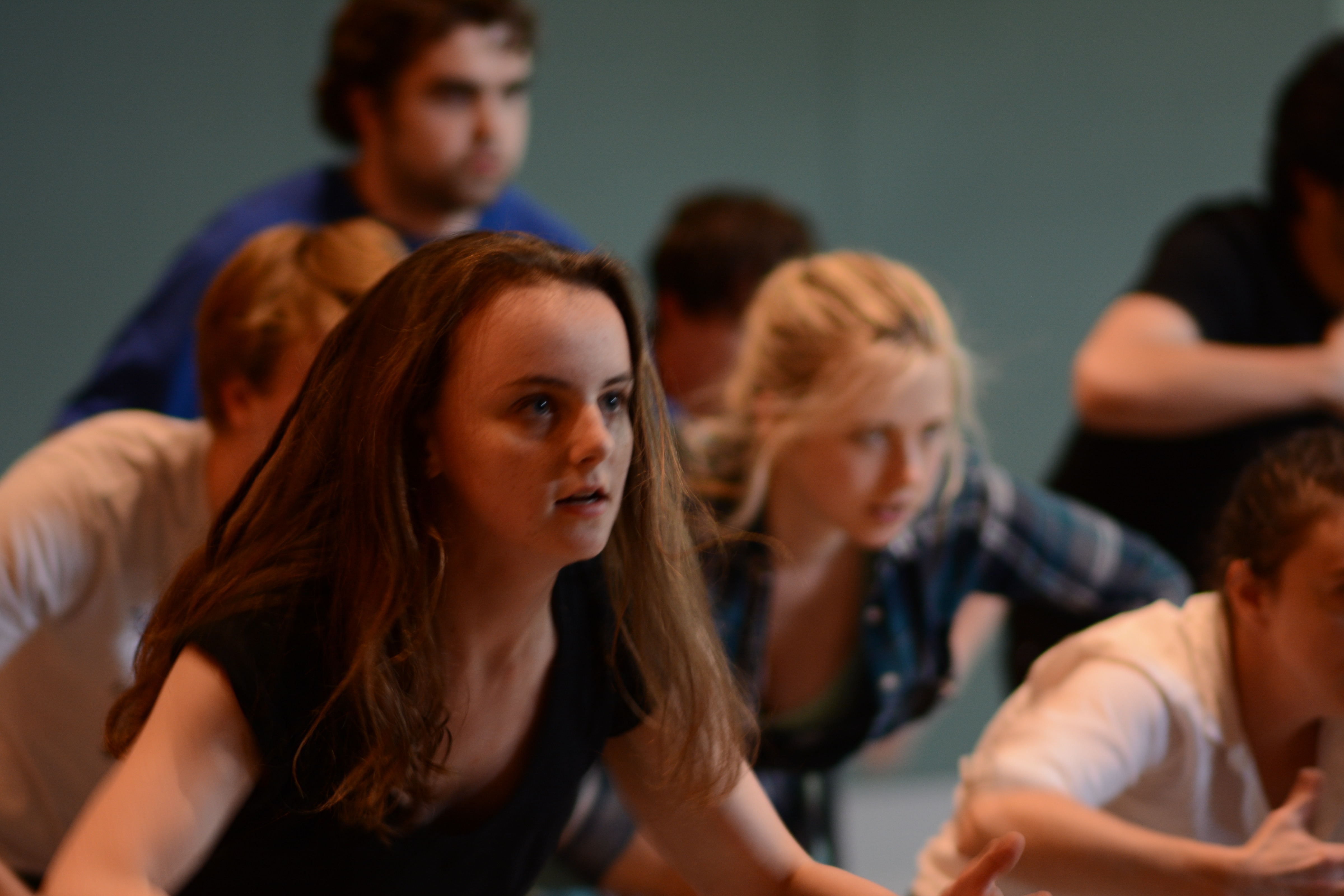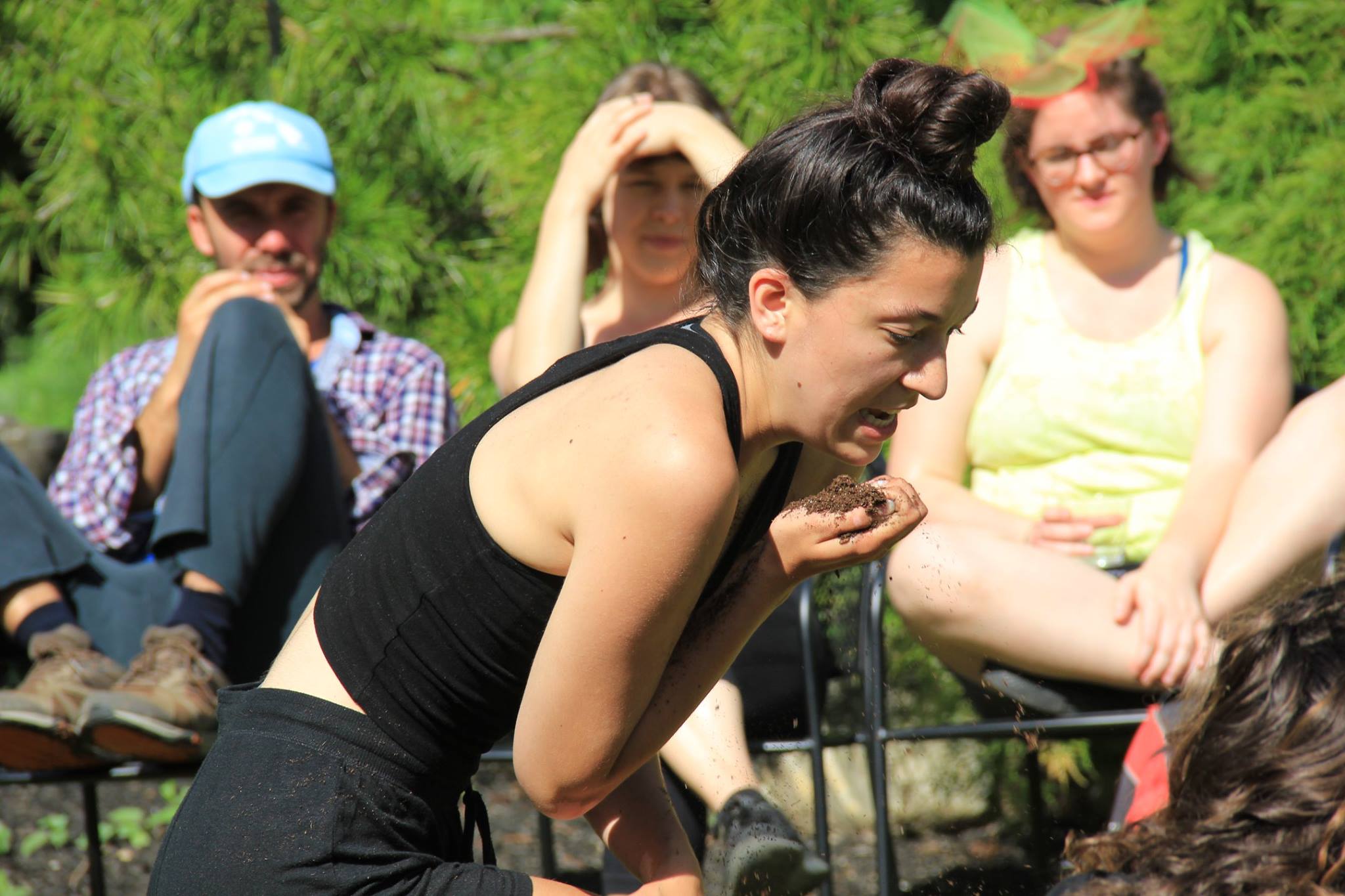The JKB has been quieter than usual these past few months of summer, but Skidmore Theater students have been as busy as ever. Read about a few of their experiences that span from right here in Saratoga to all the way across the country.
Kallan Dana ’19: Stella Adler Studio of Acting (NY, NY)
This summer, I studied at the Stella Adler Studio of Acting in New York. I was able to attend Adler’s Summer Conservatory after receiving the SEE-Beyond Award, which funded my enrollment in the program, along with my housing. Over the course of the ten-weeks I spent at Adler, I discovered how to be a more generous actor and person. I went into the summer thinking that I knew more than I knew, and believing, unconsciously, that there was only so much I could be taught. My instructors did not allow me to hold onto these cynical habits. On the first day, after having known me for less than an hour, my movement teacher told me that I took things too seriously. She reiterated throughout the duration of the course that, as actors, we needed to give ourselves the opportunity to be someone else, to do things that we might feel too embarrassed to try out in our normal lives. This sort of attention and encouragement allowed me to open myself up to receive more of the world around me, and, consequently, to be a more honest performer. The Adler technique’s foundation emphasizes “awareness without judgment,” and I will strive to continue to use this maxim even as the summer ends, and as I’m tempted to retreat into self-consciousness. I know that I am a more worthwhile actor when I am receptive and vulnerable, and I’m grateful for my instructors and classmates at Adler for showing me that.
Zoe Lesser ’19: The Orchard Project (Saratoga Springs, NY)
I was a core company apprentice for The Orchard Project. The Orchard Project is a residency for theater artists based in Saratoga Springs, with the goal of supporting new ideas and accelerating new theater projects. As an apprentice, I had the opportunity to watch the resident artists make new work. I served as the designated apprentice for three specific artists, while getting to sit in on the rehearsals of other processes as well. I apprenticed LubDub Theater Co., a physical theater company working on an immersive cocktail seance piece, Real/Time Interventions who are creating a solo cabaret about female serial killers, and Krissy Vanderwarker and Morgan McNaught, who are creating a piece about gentleness and play that will take place in a geo-diesel dome. In addition to apprenticing, core company members work on their own projects which are supported by each other and often collaborative. I began the process of creating a solo show based on “The 32 Questions That Lead to Love” New York Times article that I am hoping to develop at Skidmore in the spring. The Orchard Project is a community—we all live together, we eat every meal together, and as a result, we share ideas with each other and help each other. Getting advice on my work from the Orchard Project staff, the resident artists, and my fellow apprentices was an incredible privilege that taught me a great amount about making new work.

(Photo provided by Zoe Lesser ’19)
Becca Gracey ’18: Williamstown Theater Festival (Williamstown, MA)
Every day was different at Williamstown. We got our daily schedule the night before (sometimes at late as 1AM). Our summer was made up of acting classes, running lines with actors, working front of house, waking up at 2AM for a scenic changeover shift, play readings, and working backstage on wardrobe or deck crew.
One of the most challenging aspects of my experiences was the fact that Williamstown doesn’t guarantee acting opportunities. There are directing interns in the company who present three nights of ten minute plays in which the acting apprentices can be cast. With 70 apprentices, the competition is steep. After the second round of not being cast I felt really down. But then my friends and I decided to produce our own theater. Thus came FemmeFest, a night of theater performed by women.
From the actors at the festival, I learned about living in New York, the process of earning equity, their personal stories, and much more. But most importantly I learned a lot about myself and my limits. It’s hard to run on so little sleep, with no one thanking you for your work. But I learned that the gratification came from taking joy in the theater we produced. I saw every show as many times as I could.
Kyle Ferris ’18: Shakespeare & Company (Lenox, MA)
For as long as I can remember I have had a difficult time understanding the works of William Shakespeare. My friends recommended that I attend Shakespeare & Company’s Summer Training Institute in Lenox, Massachusetts and I must say it was an incredible experience. The average day lasted for eleven hours, starting at 9 am and going until 10 pm six days a week for four weeks. The morning would focus on a mix of Linklater voice work and movement, warming up both our voices and our bodies. In the afternoon, we put both to work while exploring Shakespearean text in our scenes. Meanwhile, we studied other things like stage combat and Elizabethan dance. In the evening, we would either continue to work on our scenes, see a theatrical performance, or take a master class by one of Company’s leading actors. This was one of the greatest experiences of my life and I would recommend it to anyone. However, I would say that it takes a lot of heart and soul, an open mind, and a willingness to change.

(Photo provided by Kyle Ferris ’18)
Rowen Halpin ’19: Shakespeare & Company (Lenox, MA)
This summer I had the thrill of participating in Shakespeare & Company’s summer training institute, nestled in the Berkshires in the small town of Lenox, Massachusetts. I was lucky enough to receive funding for this experience through the Skidmore Theater Department’s scholarship specific to this program. It is hard for me to sum up what all of these classes, brilliant teachers, and incredible comrades gave me, but some of my biggest takeaways from these four weeks were: It’s all on the page. If I allow myself to let go of the control I have conditioned myself to “need,” I will be able to access any and every emotion that the words command. I am the sum of all of my lived experiences; to ignore any of them is to ignore a central part of myself and if I’m not being truthful to myself, how can I be truthful onstage? Breath brings change. Judging my own performance isn’t as interesting as listening to what my scene partner is saying to me.I am enough. Play!- don’t be afraid to be silly and have fun.This program was incredibly challenging but it was exactly the kind of challenge I think I needed right now as an actor, student, and human. I will carry the lessons I learned at Shakespeare & Company in my body, my mind, and my heart for the rest of my life. If you’re looking to take big risks, feel deeply, and gain a profound love for words and the world around you, I cannot recommend this program enough.

(Photo provided by Kyle Ferris ’18)
Rebecca Rovezzi ’18 SITI Summer Intensive 2017 (Saratoga Spring, NY)
As most people who have participated in this intensive over the past 25 years will understand, I’m finding it difficult to sit down and write any sort of reflection about my experience because it’s *almost* impossible for me to find the words to explain the impact the training had on me as a person and an artist. I think it was SITI company member Ellen Lauren who at one point joked during week two that it’s called an intensive for a reason, and it was truly one of the most intense, exhausting, thrilling, invigorating, frustrating, and inspiring months of my life so far. I felt like a human sponge the entire month, even in the moments when I was creating or performing, just trying to soak up everything I could from my incredible fellow participants and SITI company members. I promised myself on day one that I would try to write down at least one idea, moment, or lesson that completely blew my mind. Not only did I easily add to the list every day, but by the end of the month I was writing down at least five things a day. I thought I’d share a few short ones.
Day 3: From best to worst -1) a good idea well executed 2) a bad idea well executed 3) a good idea poorly executed 4) a bad idea poorly executed. Young artists often switch 2 and 3.
Day 5: Paying super close attention to center of gravity, breath, and focus point in our daily lives would drive us crazy; but when onstage it makes us believable.
Day 7: Mary Overlie almost called Viewpoints windows. Think of the viewpoints as windows to view the stage through.
Day 11: Before you break the rules you need to understand the rules you’re breaking.
Day 13: Our perception of duration is directly influenced by our psychological state.
Day 16: The question isn’t/shouldn’t be “What looks cool?” it’s “What does the group and/or the space need?”
Day 16: Good writing is re-writing.
Day 20: With collaboration sometimes you need collision. Let if fuel you not unhinge you.

(Photo provided by Rebecca Rovezzi ’18)
Sydney Tennant ’18: Geffen Playhouse (Los Angeles, CA)
I did an internship at the Geffen Playhouse in LA with the Education & Community Outreach and Development departments. The internship was through the Los Angeles County Arts Commission program, which offers over 120 paid internships with various arts organizations to college students.
An average day consisted of working closely with the education and development departments to plan their various education programs for the upcoming 2017-2018 season. I read the entirety of the new season, helped developed lesson plans about the plays, wrote to donors for funding, and helped out around the office.
One of the most inspirational experiences I had there was helping teach a middle school intensive in Inglewood as an assistant teaching artist. Most of the kids I worked with did not even know what theater was. It was really cool to help open their eyes to what theater is and can bring to people’s lives. This was also my most challenging experience of the summer. We found out eventually that the program consisted mostly of kids who were forced to be there by their parents who didn’t want them around the house or because they needed to go to “summer school” to make up credits. Basically, to them, it was like detention. It was really difficult to get a group of 45 eighth graders interested in learning theater, especially with just two teachers per classroom.
I learned a lot about what it means to be a teaching artist and how to plan lessons about theater for kids who have never experienced it. I also developed a greater sense of awareness of what it means to be a white teacher in predominantly African American and Latinx schools, and the growth and learning I have to do regarding how to acknowledge my privilege in an educational environment.
***
Curated and edited by Senior Theater/English majors and co-editors-in-chief of STLN Ziggy Schulting ’18 and Rachel Karp ’18
